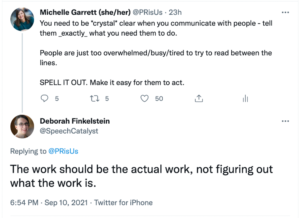I saw this tidbit in Michelle Garrett’s newsletter this week:

Did you hear the mic drop right there? Or was that your head nodding wildly?
I know for me, it was the moment I went “YES, thank you.” Because like you, like nearly every single freelancer who has ever worked for a client, I have been there. Thank you, Deborah Finkelstein, for saying it out loud.
And haven’t we all spent countless hours trying to figure out exactly what that client wants? Especially now, not one of us has the extra patience to guess at what that is.
It happens — clients often come to us with no idea what they want. Or need. Not always, but it happens.
It also happens that they come to us knowing exactly what they need, but have no ability to tell us what that is.
And that’s up to us to fix.
[bctt tweet=”When a #freelancewriting client can’t communicate their project, it’s on you to fix that.” username=”LoriWidmer”]
Having conducted more interviews than I could possibly count, I’ve come across interview sources like this, too. They come with all these solutions and ideas, but they haven’t told me the problem yet.
That’s where your ability to ask smart questions will serve you well, my freelance writing dynamo.
When I come across someone who isn’t conveying their message in a way that makes sense, I revert to my list of questions intended to draw the ideas out of them (with a crowbar, if necessary):
What do you want to say with this piece?
Why I love this: It gets them out of their ideas and into their purpose. A month ago, for example, I had someone on the phone who was rambling with ideas. I couldn’t have connected those ideas at all without that question. The “This helped one client reduce their losses by 43% in one month” and the “We took a look at their balance sheets and saw the problem” can be turned into “I want to show how this solution can reduce payroll risks and improve the overall function of the accounting department.”
Who is the audience you want to reach?
Why this works: It keeps you focused on the right people. For instance, I write for both insurance agents and insurance carriers. Very different needs, which means writing an article on how to sell cyber insurance to individuals isn’t going to wash with the insurance carriers, who are already specialized in how to sell this.
Suppose you’re writing an article about electronic vehicles. If the audience is consumers and not the people in the industry supplying the manufacturers, you’re not going to sell them on an article that details supply chain issues during a pandemic or the issues surrounding a competitive market or an economic downturn. Knowing the audience is critical to getting it right.
Can you clarify again the points you’d like to make?
Why it’s a great question: While they may have given you the “what” they may not have given you the why, how, or when. Go on, ask.
- Why are they writing this now?
- How will this change something/improve something/cause upheaval…?
- When will this happen, and when it does, what next?
Did I understand you to say …. ?
Why you should ask this: It really is that easy to get clarification before you get off the phone or before you agree in email that you understand it all. Repeat it back. Make sure you’re both understanding what’s happening. Then when you write up your contract or statement of work, you can further cement in both of your minds what this project is about and what the intended results will be. My usual line is “Just so I understand, and please correct me if I’m wrong …”
How do you see me helping you?
Why you shouldn’t skip this: If you think you’re writing and they think you’re writing, promoting, distributing and acting as a publicist, that’s a big disconnect in expectations. Most clients will say “Well, I’m hoping you can put this idea down for me in a coherent way.” But some do think you’re now the social media/keyword guru, the marketing maven, and the overall project babysitter. In one case, I had a client register shock when I responded that no, I don’t handle distribution or marketing — I write and I edit.
Writers, how do you narrow down that client’s wishes to something you can run with?
Have you ever had a situation that was as clear as mud? How did you resolve it?